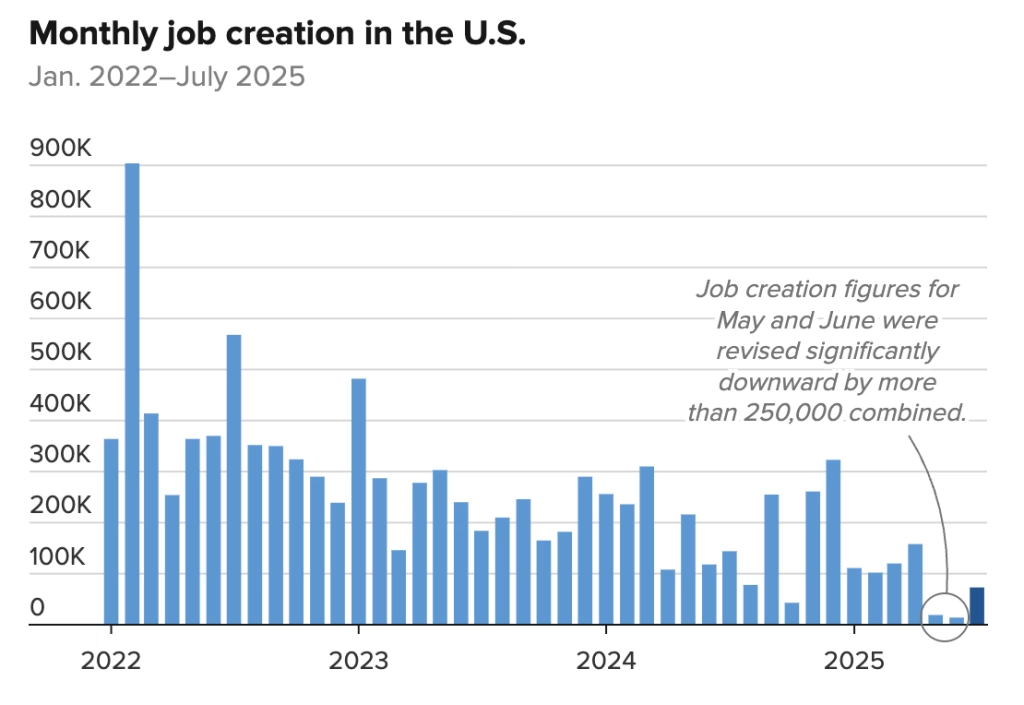Via Forbes: Unemployment Rose To 4.2% In July As Hiring Fell Sharply.
About 73,000 nonfarm jobs were added last month, below economists’ projections of 115,000 and less than half the 147,000 added in June.
Some comparative data.
An average of 130,000 jobs added per month this year is the weakest since the January to June period in 2010, as the U.S. economy recovered from the Great Recession. An average of 168,000 jobs were added per month last year, compared to the roughly 400,000-per-month average from 2021 through 2023 as businesses recovered from COVID-19 lockdowns.
In regard to tariffs:
It’s not immediately clear whether Trump’s tariffs have directly affected the number of jobs available, though retail and automotive sectors have recorded an increase in layoffs. The retail market cut nearly 80,500 jobs in July, a year-over-year increase of 249%, according to the Challenger report, as companies cited tariffs, inflation and economic uncertainty.
The bottom line to me is this: Trump inherited a pretty healthy economy. He could have done nothing and claimed credit for things continuing as they were (which was more or less what he did in his first term, having inherited a healthy economy from Obama). Instead, he has been playing havoc with the global economy and is creating conditions to damage, not invigorate, the economy.
The notion that all of these “deals” are making things better for US trade is nonsense.
For example, Krugman notes the following (to my point about doing nothing), I Coulda Made a Better Deal.
When I point out that Trump’s idea of trade deals seems counterproductive even in terms of his claimed goal of boosting manufacturing, I get some pushback from readers along these lines: “Oh, yeah? If you’re such an expert on trade negotiations, tell me what deal you think you could have made.”
OK, I can answer that. If I had been in charge of negotiating with the European Union, I would have been able to get a deal with the following components:
· Very low tariffs on U.S. exports of manufactured goods to Europe, on the order of 1 percent
· Near balance in bilateral trade, with U.S. exports to Europe close to 90 percent of our imports from Europe
· U.S. companies allowed to operate freely in Europe, earning hundreds of billions a year in profits
· European corporations investing more than $150 billion a year — real investment, not loans — in the United States
Why do I believe that I could have negotiated a deal like that? Because that’s what U.S.-EU international transactions actually looked like in 2024. So that’s what we could have gotten by doing nothing.
Emphasis mine.
Also, Krugman: The Meaning of a Weak Jobs Report.
Contrary to myth, tariffs don’t necessarily cause high unemployment. They make the economy less efficient and poorer, but don’t necessarily reduce the total number of jobs. For example, Britain in the 1950s had high tariffs and import controls, but also full employment. The claim that Smoot-Hawley caused the Great Depression is a myth, one fostered in part by anti-Keynesians who didn’t want to admit that the problem was inadequate demand and the answer fiscal stimulus.
But Trump has brought something special to the mix: Not just high tariffs, but unpredictable tariffs. Since April 2 nobody (probably Trump included) has had no idea what tariff rates will be for the next few months, let alone for the long term.
Heckuva job, Donnie!
Update: More bad numbers.
Via the NYT:
Government employment fell in July as the federal government continued to shed jobs amid the Trump administration’s efforts to slash the work force. The federal government lost 12,000 jobs last month, and is down by 84,000 jobs since the start of the year.
I would note: this is directly a result of Trump policy.
Manufacturing employment also declined by 11,000 jobs in July, the third straight month of job losses in the industry. Mr. Trump’s tariffs are intended to boost manufacturers and encourage consumers to buy domestically. But steeper tariffs have pushed up costs for foreign parts, which has hurt some manufacturers.
But, I thought tariffs were supposed to enhance manufacturing!
Via CNBC: U.S. added just 73,000 jobs in July and numbers for prior months were revised much lower.
…the June total of 14,000 but below even the meager Dow Jones estimate for a gain of 100,000, the Bureau of Labor Statistics reported Friday. June and May totals were revised sharply lower, down by a combined 258,000 from previously announced levels.
[…]
The June total came down from the previously stated 147,000, while the May count fell to just 19,000, revised down by 125,000.
This will, no doubt, be described as either “fake news” or “some, something, Deep State.”
Here’s a chart:

Click this link for the original source of this article.
Author: Steven L. Taylor
This content is courtesy of, and owned and copyrighted by, https://www.outsidethebeltway.com and its author. This content is made available by use of the public RSS feed offered by the host site and is used for educational purposes only. If you are the author or represent the host site and would like this content removed now and in the future, please contact USSANews.com using the email address in the Contact page found in the website menu.







